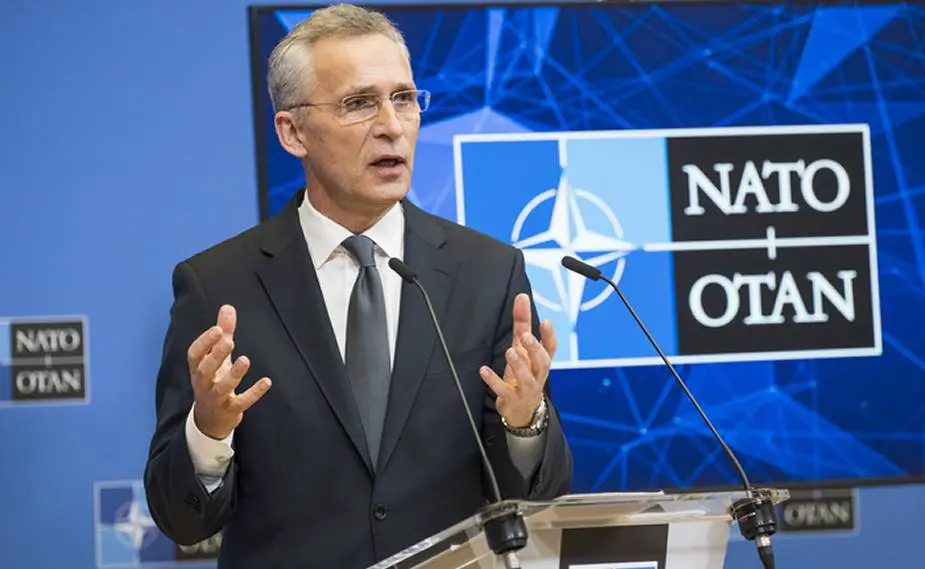NATO Defense ministers urge changes to Alliance collective defense
As reported by Jim Garamone on NATO’s website, Russia's unprovoked attack on Ukraine has changed the security environment, and the North Atlantic Alliance will change, too, NATO Secretary General Jens Stoltenberg said at the conclusion of a meeting of alliance defense ministers in Brussels on March 16. Secretary of Defense Lloyd J. Austin III attended the meeting for the United States.
Follow Army Recognition on Google News at this link

"Russia's unprovoked attack on Ukraine has changed the security environment, and the North Atlantic Alliance will change, too", NATO Secretary General Jens Stoltenberg said at the conclusion of a meeting of alliance Defense ministers in Brussels on March 16. (Picture source: NATO)
While Russian President Vladimir Putin's "war of choice" will force new strategies for the 30 NATO countries, they will reinforce the alliance's bedrock assumption of collective defense: an attack on one is an attack on all (NATO art. 5): article 5 is the cornerstone of the North Atlantic Treaty Organization (NATO) and states that an attack on one member of NATO is an attack on all of its members. Despite its importance, NATO has only invoked Article 5 once in its history—in response to the terrorist attacks of September 11, 2001.
At the NATO summit held in Brussels on March 16, the Defense ministers were first joined by NATO partners Finland, Sweden, Georgia and the European Union, and received a briefing from Ukrainian Defense minister Oleksii Reznikov on the situation in Ukraine. “We all paid tribute to the courage of the Ukrainian people and the Ukrainian armed forces,” said NATO Secretary General Jens Stoltenberg. Ministers agreed that NATO’s support to Ukraine must continue, including with military supplies, financial help and humanitarian aid. “NATO is responding to this crisis with speed and unity,” said the Secretary General, adding that NATO leaders will meet next week for an extraordinary NATO Summit.
The Defense ministers agreed that immediate aid to Ukraine was necessary, and also looked at the steps the alliance is taken to defend NATO countries at risk: "Moscow should be in no doubt: NATO will not tolerate any attack on allied sovereignty or territorial integrity", Jens Stoltenberg said during a press conference. "We have already activated our defense plans to shield the alliance, increase our readiness and deploy troops from both sides of the Atlantic. There are now hundreds of thousands of forces at heightened alert across the alliance, 100,000 U.S. troops in Europe and around 40,000 troops under direct NATO command, mostly in the eastern part of the alliances backed by major air and naval power, as well as air defenses."
These steps put Russia's Putin on notice, but more needs to be done, Stoltenberg said: "We must reset our collective defense and deterrence for the longer term. Today, we tasked our military commanders to develop options across all domains land, air, sea, cyber and space."
On land, the new posture should include substantially more forces in the eastern part of the alliance at higher readiness, he said. That should include more prepositioned equipment and supplies for troops to fall in on, should this become necessary. In the air, Stoltenberg called for more allied air power and strengthened integrated air and missile defense. In the maritime environment, he called for carrier strike groups, submarines and significant numbers of combat ships on a persistent basis.
"We will also consider the future of cyber defenses and how best to draw on allied space assets," Stoltenberg said. "We should also train and exercise more often and in greater numbers."
These changes will require major investments. He called on all allies to invest a minimum of 2% of the gross domestic product in defense. "I welcome that allies such as Germany and Denmark have already made important announcements on more investments and faster timetables," he said.
The alliance needs to spend more together. "NATO common funding is the essential enabler that allows us to work together," he said. "It is a force multiplier for national defense efforts, and it shows solidarity as allies. At this critical moment for our security, unity between North America and Europe in NATO is more important than ever."
























